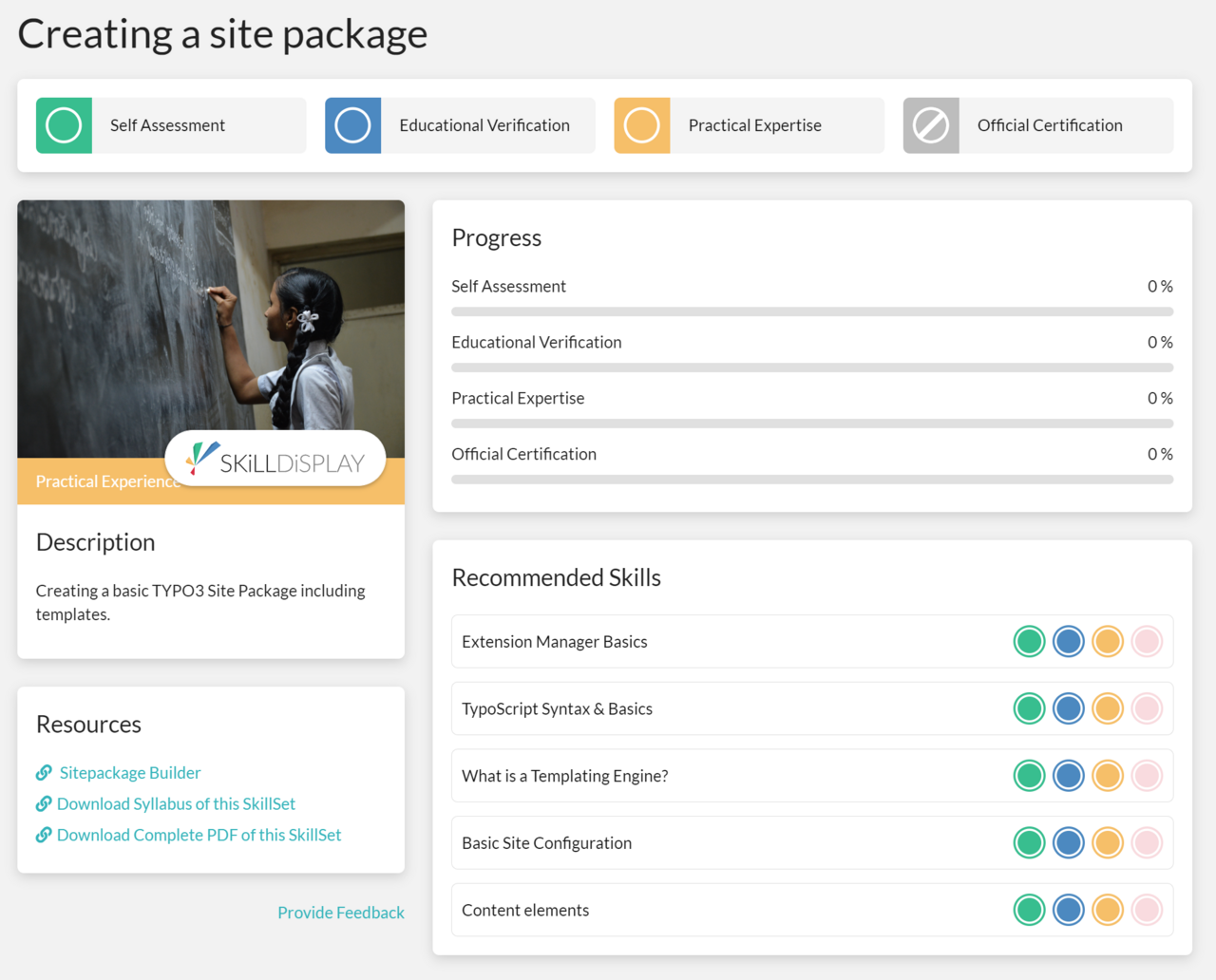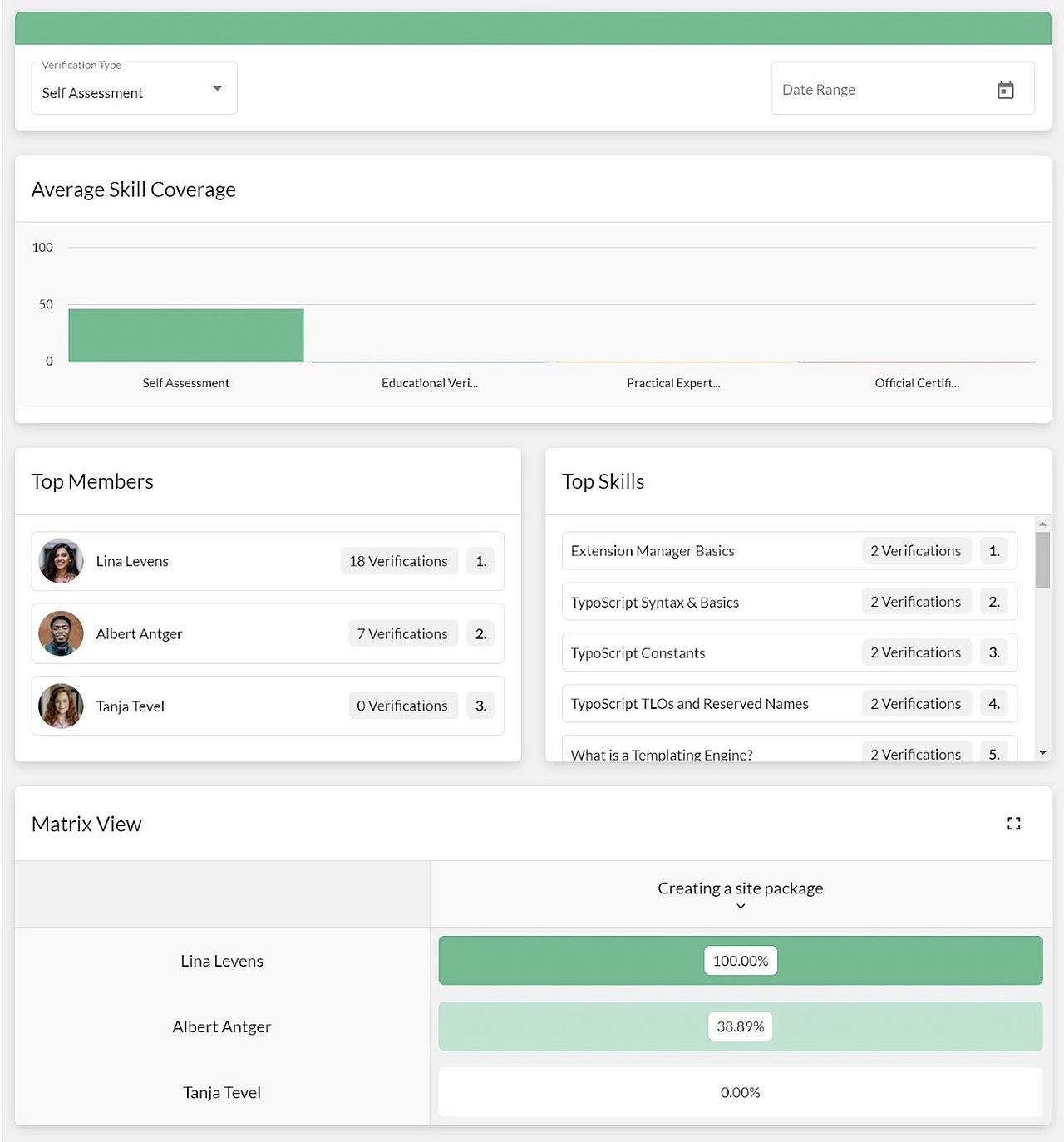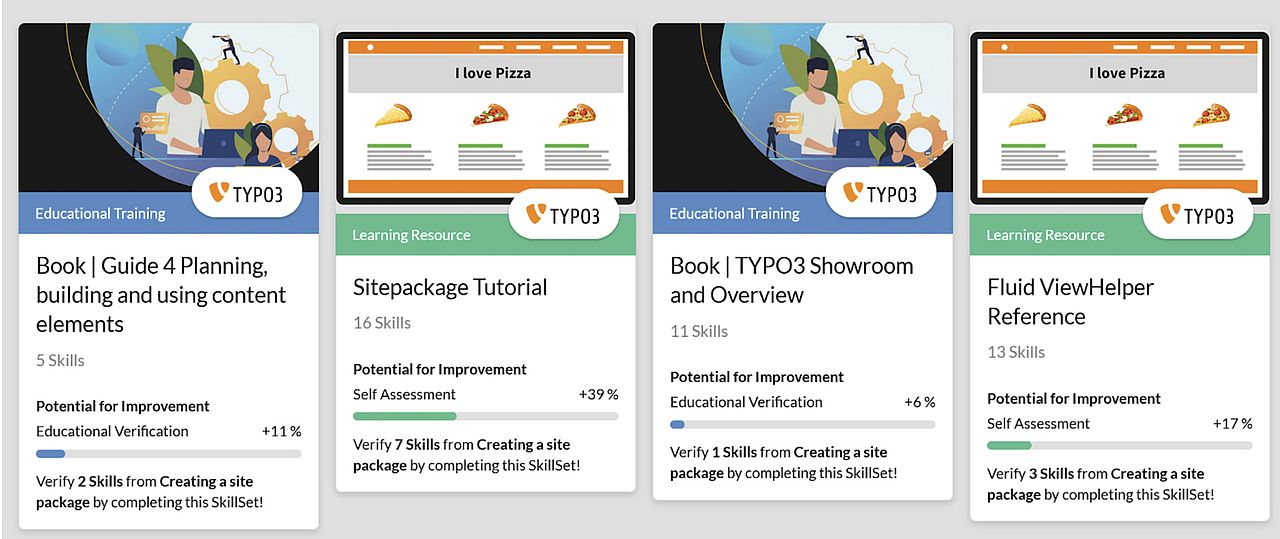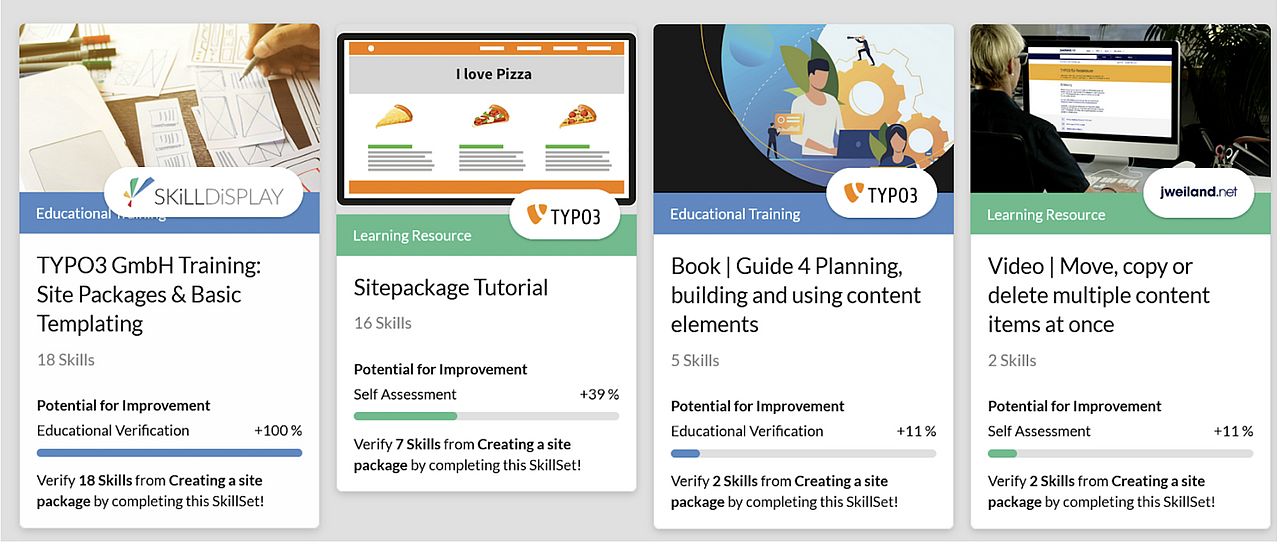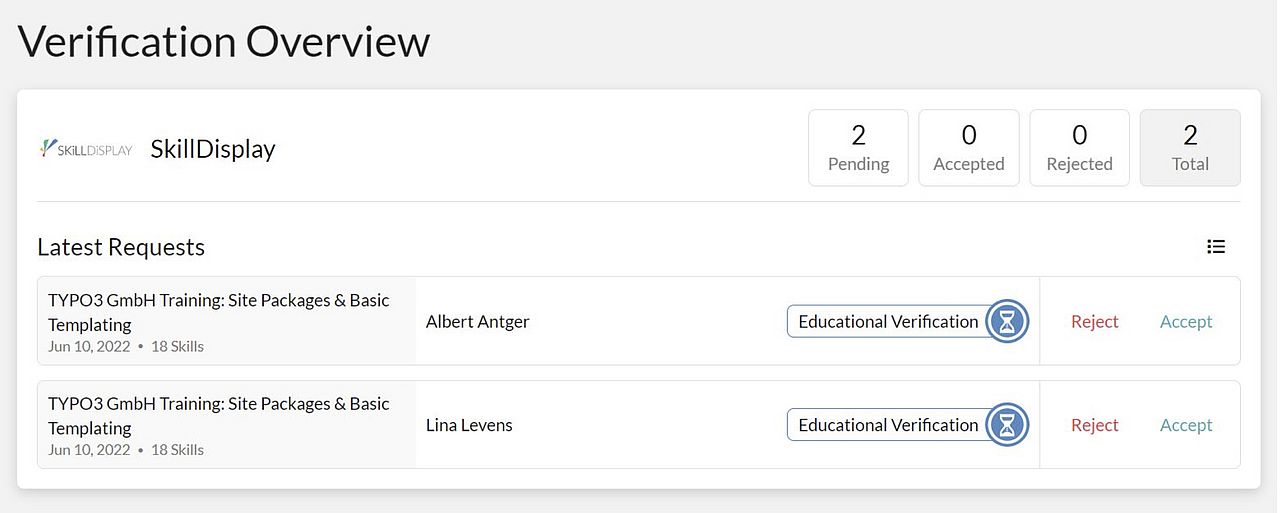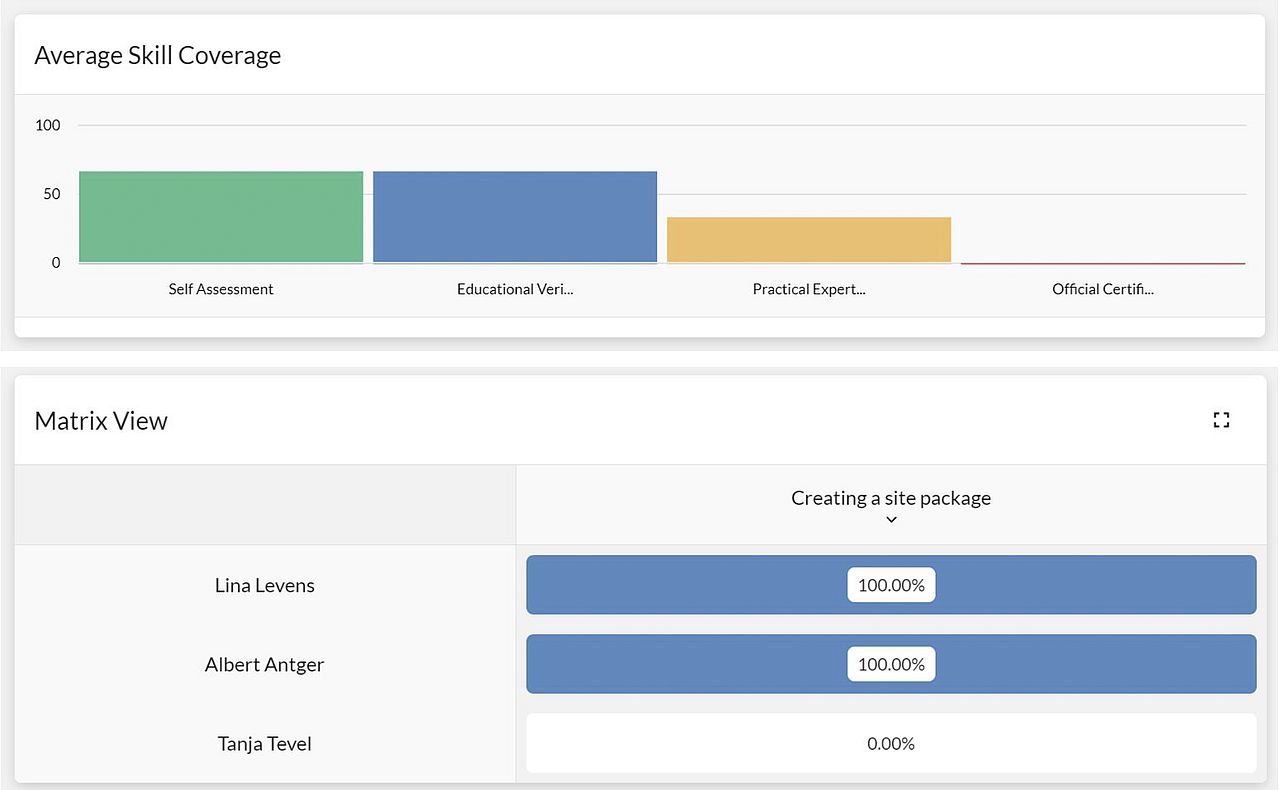
SkillDisplay - Setting up and profiting from competency standards in your company
Thanks to Florian Weiss from SkillDisplay for sharing!
In this article, we‘ll give you an overview of how to use SkillDisplay effectively to achieve your business goals when working with TYPO3. We’ll outline the business needs for a use case and define the necessary skill sets to find the best people available for the job. In addition, we’ll make use of public resources and link internal training possibilities to automatically create personalized learning paths for employees and reward their competencies with digital credentials.
A new job
A customer just signed a new contract with our agency. We can break down their requirements as following:
- They need the basic setup for creating, maintaining as well as rendering basic TYPO3 content (aka a Site Package)
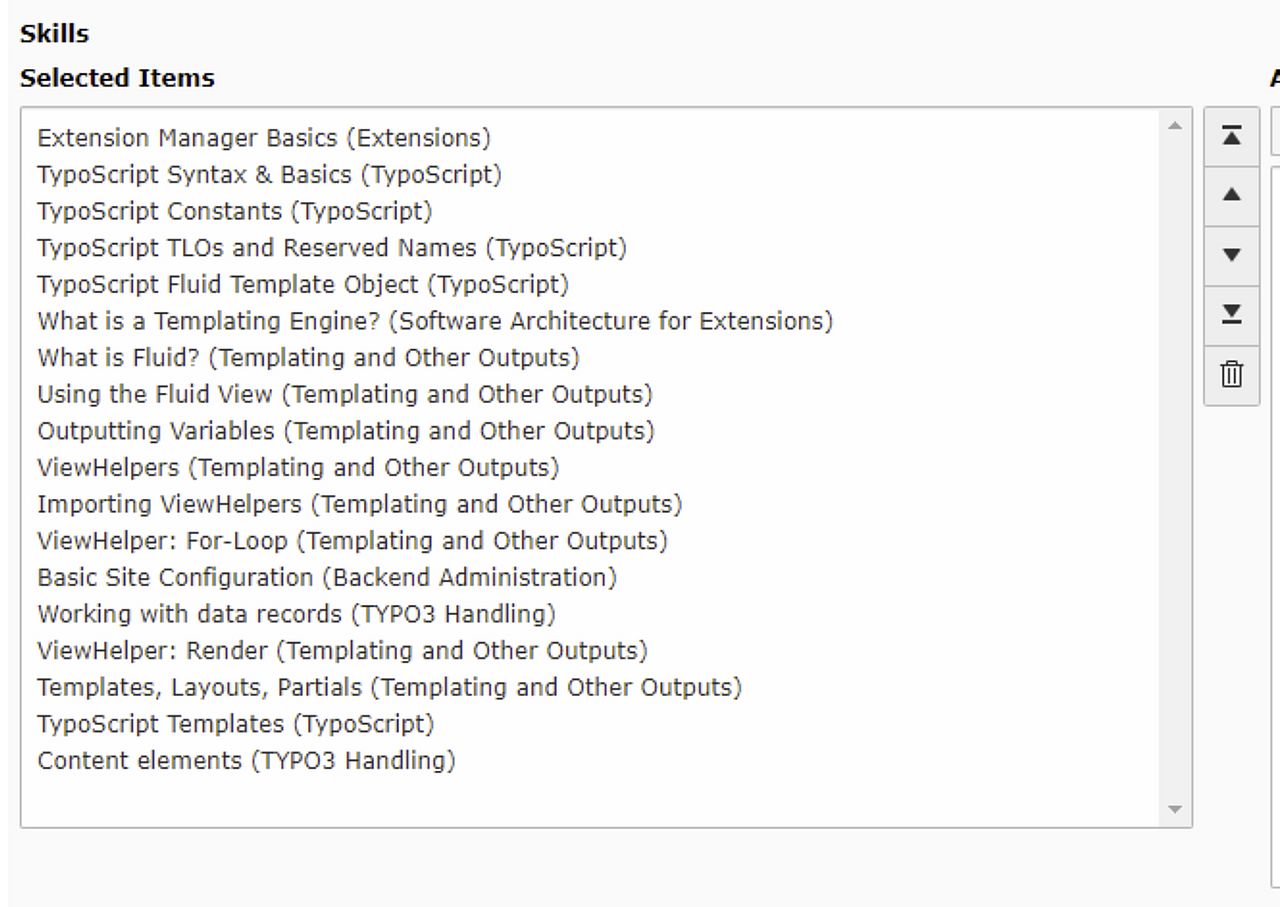
Can we do that?
The answer may seem obvious. We’re a TYPO3 agency – of course we can do that. But there are more nuances to this question than we might spot at first glance.
Let’s create a new task “Creating a site package” and pick the necessary skills. For TYPO3 this is very quick, as all skills are already defined and are exactly matching the syllabus for official certification. (https://typo3.com/services/certifications)
We go to the SkillDisplay backend, create a new SkillSet and pick the skills we consider relevant for this task:
With creating the task definition, we can instantly reap the following benefits:
- Employees can check their skills against a defined task by checking the “Progress” card. (“Can I do this?”)
- We communicate a clear idea of a required task that brings value to our company. Employees can check the goals for each single skill and mark them with “Self Assessment” if they are confident that they can fulfill the requirements
In this case we’ve selected “Self Assessment,” giving us an overview of what our employees believe they can do and instantly spot the following key factors:
We only have one employee who believes she’s fully up to the task (Lina)
- Albert is on his way and might profit from help developing his skills, so we have a second person who can cover tasks like this
- Tanja did not engage in any skills which are required for this task yet (She’s an intern that just started)
- Our average Skill coverage for the whole set of skills needed to create a site package is under 50%
Uh Oh – we’re in big trouble if Lina calls in sick. Can we enable Albert to cover the task?
Define upskill opportunities
Having identified a lack of skill coverage, we have to think about how to enable Albert.
Ready to use suggestions
Luckily Albert can instantly check all training publicly listed on the SkillDisplay platform matching his personal skill level.
This means SkillDisplay shows Albert the resources:
- he can make the most use of
- for the specific task he selected
- right at the time, he wants to develop his skills
He selects the “Create a site package” task and sees the following listing in the “Extend your Knowledge” section:
Albert can instantly spot:
- Free learning resources indicated in green
- Paid resources and training in blue
Looking at the options, Albert chooses to check out the Sitepackage Tutorial provided by the TYPO3 Documentation Team. It does not only cover a potential improvement in his skills of 39% but is also freely available. He makes a note however to ask his senior about purchasing the TYPO3 book (https://www.typo3book.com/), as it seems to cover a wide range of skills that might come in handy later.
Company internal suggestions
We are very happy about the internal motivation of our employees and their trust in their abilities but would feel a bit better having an external authority confirm the skills of our employees.
We schedule a meeting with Tanja, and she suggests an official training by the TYPO3 GmbH with the topic: “Site Packages & Basic Templating” (https://shop.typo3.com/Site-Packages-Basic-Templating/TRAIN.BP2)
We book the training for Albert and Tanja and receive very good feedback from them once they return. We’d therefore like to suggest this training to our employees automatically in the future, but it is not publicly listed on SkillDisplay yet. We ask Tanja about the training content, and she is confident that it covers all skills we listed in our task definition, therefore, we just copy the SkillSet of the task, mark it with the “Educational” flag, and rename the copy. We also add a link directly to the training registration.
Let’s check out what this means for Alberts training suggestions:
The top suggestion is now the training by the GmbH. This doesn’t come as a surprise because we created it as a copy of our task definition. Keep in mind that the training will now be considered for suggestion in ALL future tasks we create though. So, if we have a different task ahead of us, which deals with a different subset of skills, the training might still be one of the suggestions, and we, therefore, created value beyond our current use case.
(Please note: the SkillDisplay logo on the GmbH Training SkillSet doesn’t mean that this training is offered by SkillDisplay, but that it is one of the SkillSets our company added to our internal suggestions)
Reward proof of competence
Having sent two of our employees to official training, we’d like to reflect this in our skill matrix. There are certain scenarios for that:
- The trainees can request educational verification directly from the training institute if they use SkillDisplay themselves (via manual confirmation or automatically by using the SkillDisplay API)
- The training institute of your choice does not use SkillDisplay and your employees request educational verification internally
For this use case, we’ll assume that we mark completed trainings internally. Tanja is in our administrative department, and we’ve granted her permission to verify the skills of our employees who have completed training.
Lina and Albert open the TYPO3 GmbH Training SkillSet, click on “Educational Verification” and they select Tanja as the verifier. Tanja receives a notification that the two employees would like to receive confirmation for their skills, so she checks the training bookings and grants the request.
Meanwhile, the customer's project was successfully implemented by Lina, and we confirmed her “Practical Experience.” (Either by a designated verifier in our company like the example of Educational Verification above or via the API when connecting a system like JIRA with SkillDisplay)
Let’s see how this affects our organization’s member statistics for the scenario of “Creating a site package”:
- Our average skill coverage has increased to 66,67% (2 of 3 members believe they can do the job and are trained for it. 1 member has the practical experience and formerly done the job)
- The matrix view gives us specifics about individuals, and we see the confirmed training experience of Albert and Lina
Confidence in their own abilities
It is nice to know who is up to a task as an employer, but we’d also like to boost our employee’s confidence in their own skills and motivate them to claim acknowledgment for their abilities.
This is why the SkillDisplay platform does not only show training possibilities for improvement, but also ways to apply gained knowledge. Let’s check out Linas’s suggestions for applying her knowledge when selecting the “TYPO3 GmbH Training” SkillSet:
Lina can instantly spot that:
- she believes in her abilities and has proof of training for the task of “Creating a site package” in her own company
- she already possesses 19% of the skills necessary for attempting official certification for the TYPO3 Certified Integrator
Custom learning paths for everyone
We can see how many benefits we already gained from this very simple use case and a single task definition. When defining more tasks relevant to your company’s everyday work, however, we can easily see the power behind a professional skill management platform like SkillDisplay.
- Your employees can develop their skills proactively, having freedom of choice while still being guided towards company set goals
- As an organization manager, you have a clear overview with statistics that instantly adapt to your relevant use case
- The flexible SkillSet system and future proof methodology allows you to build your task and knowledge base slowly over time while preserving company competency information whenever it is gained
As a TYPO3 company, your start couldn’t be easier. All relevant skills are already pre-defined by experts, and in line with official certification, many relevant resources like TYPO3 Documentation links are already available as public recommendations.

